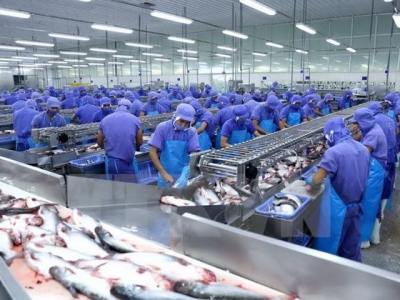Tra fish companies see profits slump in pandemic

HÀ NỘI — Multiple tra fish companies suffered losses due to falling export prices and lower orders, focusing instead on the domestic market amid the COVID-19 pandemic.
Workers at the Vĩnh Hoàn Joint Stock Company process tra fish for export. VASEP said tra fish was among Việt Nam’s most affected seafood products amid the pandemic with export turnover dropping by over 31 per cent in the first half.— VNA/VNS Photo Vũ Sinh
According to the Việt Nam Association of Seafood Exporters and Producers (VASEP), the COVID-19 pandemic has strongly affected the world seafood industry, leading to a reduction in consumption and causing orders to decrease by 35-50 per cent.
Social distancing measures in April caused interruptions in international trade. Enterprises lacked raw materials for processing, facing difficulties in transportation, payment and lacking capital to maintain operations.
VASEP said tra fish was among Việt Nam’s most affected seafood products in the pandemic with export turnover dropping by over 31 per cent in the first half. Declining new orders, high inventories and low export prices have made profits of businesses plummet.
The Đồng Tháp Province-based Vĩnh Hoàn Company (VHC) announced that second-quarter profit halved to VNĐ215 billion (US$9.2 million) compared to last year.
Six-month profit also halved to nearly VNĐ368 billion, thus fulfilling 35 per cent of the yearly target.
Vĩnh Hoàn is researching investment strategies for raising profit via value chains. Besides traditional tra fish export activities, the company aims to increase sales of fish fat and fish meal by 20 per cent this year, sales of collagen and gelatin products by 60 per cent thanks to the new factory being put into operation.
Nam Việt Corporation (ANV) saw second-quarter profit decrease by 79 per cent year-on-year to reach VNĐ32 billion, the lowest level since the beginning of 2017.
In the first six months of this year, net revenue dropped by 14 per cent while post-tax profit fell by nearly 79 per cent to VNĐ75.5 billion.
Although the company forecasts profit this year to fall by 72 per cent to VNĐ200 billion, it only achieved 38 per cent of the plan in the first half.
Export turnover fell by 52 per cent to VNĐ399 billion in the second quarter. However, thanks to a focus on the domestic market, the company achieved domestic net sales of VNĐ485 billion, up 113 per cent compared to the same period of 2019 and for the first time, domestic sales surpassed exports.
ANV is stepping up to exploit domestic demand by co-operating in consuming products in the distribution chain of VinEco under Masan Group.
I.D.I International Development & Investment Corporation (IDI) saw a drop of 61 per cent in Q2 profit to VNĐ26 billion.
The company said that the COVID-19 pandemic had a heavy impact on the production and export of frozen fillets of tra fish as the market was interrupted and export prices plummeted.
Six-month profit dropped by 82 per cent year-on-year to over VNĐ40 billion.
In 2020, the company wishes to expand export markets, at the same time partnering with farming households to be able to self-supply 95 per cent of raw materials.
Cửu Long An Giang Seafood Import-Export Company (ACL) earned profit of only VNĐ4 billion in the second quarter, down 93 per cent compared to the same period of 2019.
In six months, the company recorded a profit of over VNĐ5 billion, a decrease of 95 per cent and only achieved 7 per cent of the yearly plan.
Mekong Fisheries Joint Stock Company (AAM) suffered a loss of nearly VNĐ600 million in the second quarter because export turnover decreased by half compared to the same period last year.
Six-month profit reached only VNĐ71 million and fell far short of the target of VNĐ8 billion in profit set out for this year.
Có thể bạn quan tâm
 Aquatic firm set to be removed from the stock market
Aquatic firm set to be removed from the stock market Aquatic exporter Hùng Vương Group will cancel its listing on August 8 due to violations of information disclosure rules, the Hồ Chí Minh Stock Exchange (HoSE)
 Pangasius exports to England continues to increase
Pangasius exports to England continues to increase A 7.3% increase in sales of Vietnamese pangasius was recorded in England in the first half of 2020 despite COVID-19 pandemic.
 India introduces new policy to boost biofloc technology
India introduces new policy to boost biofloc technology The state government in Odisha, India has launched a new policy to promote biofloc farming in intensive aquaculture operations.